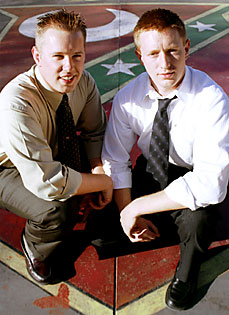 |
|
MELISSA O'NEAL/Arizona Daily Wildcat
|
Brothers Josh (left) and David Surridge are both members of the Kappa Sigma fraternity. David, an elementary education sophomore, is a legacy in the fraternity, a status given to members who have had family in the fraternity as well.
|
|
By Cara O'Connor
Arizona Daily Wildcat
Tuesday March 11, 2003
Brotherhood has always been a key value among fraternities, but for Josh and David Surridge, brotherhood has a deeper meaning.
David is a legacy in Kappa Sigma fraternity, meaning that a member of his family had been a member before he pledged this semester. In David's case it was his brother Josh that preceded him. Until Josh graduates, the brothers will be actives together.
"I think we understand more how deep the brotherhood is, how much all these guys really do care for each other, and how far they would go to help each other out," said David, an elementary education sophomore.
"When you're a legacy you take a lot more pride in your house and giving back to the house," said Alpha Gamma Rho fraternity recruitment chair Brent Wolfe. "You know that you need to live up to the expectations that the person set in front of you."
There are many legacies in fraternities and sororities on campus. UA has the largest greek community on the West coast, with 43 chapters and 2,558 total members, said Lauren Dean, Pan-Hellenic association president.
UA's sororities have an especially large number of legacies because of the greek community's size, said Greek Life Coordinator Beth Conder.
While legacies bring a strong sense of brotherhood or sisterhood to their chapters, they also bring knowledge of the how the greek system works and traditions in their chapters.
"I grew up with it, so I pretty much knew everything there is to know about the greek system," said Robyn Hauser, whose mother and grandmother were both members of Alpha Epsilon Phi before she joined. "I knew what to expect," said the family studies and human development sophomore.
Students whose families have long histories in certain fraternities and sororities often feel that they have to follow in the footsteps of family members.
"There are a lot of dads and grandfathers and uncles that really pressure their sons or daughters," said Josh Surridge, who is also the president of the Interfraternity Council.
However, that same pressure can also turn students away from the greek system, said Annie Gilbert, an education sophomore in Sigma Kappa.
If a student joins a chapter that she doesn't fit into, it can be a bad experience, she said.
"It just so happens that my sister fits into the Sigma Kappa (at her school) and I fit into the Sigma Kappa here, even though the two chapters are totally different, just like we are totally different," Gilbert said. "My extended family is always watching my sister and I thinking that we are going to do our secret handshake or something and trying to pry our secrets out of us," she said.
Legacies also come to their chapters with a certain idea about how the greek system has changed over the generations, said Sigma Chi junior Nick Pierson.
Pierson will follow in his father's footsteps by becoming the Interfraternity Council president next year. But he will not ask his father for any advice about his office, he said.
"When he went to school, things were a lot less regulated, and my parents are the first to agree that we are a lot more responsible than they were in college," the current Interfraternity Council executive vice president said. "When they were in college, it was a lot more like Animal House."
"The greek system is a lot different than it was back in the day," said Wolfe, whose brother was in the fraternity and graduated in 1992. "People need to realize that it is changing."
"I would definitely encourage my future children to do it because it had definitely gotten me more involved in the university community," Pierson said, adding that being involved in the greek system has helped to make him a well-rounded person.
"I think the experience on a whole is a positive one and the people you know, the bond you make, the experiences you have: you can't find in any other organization in college," David Surridge said.

